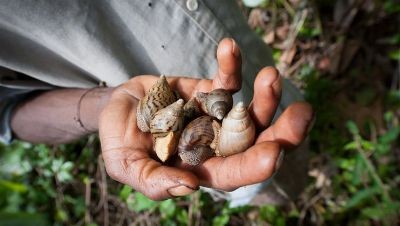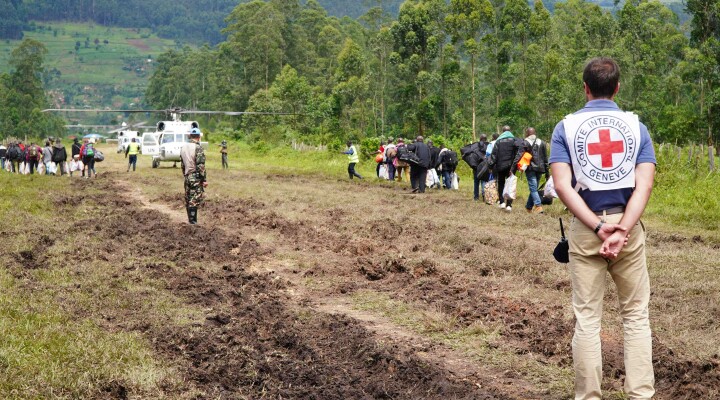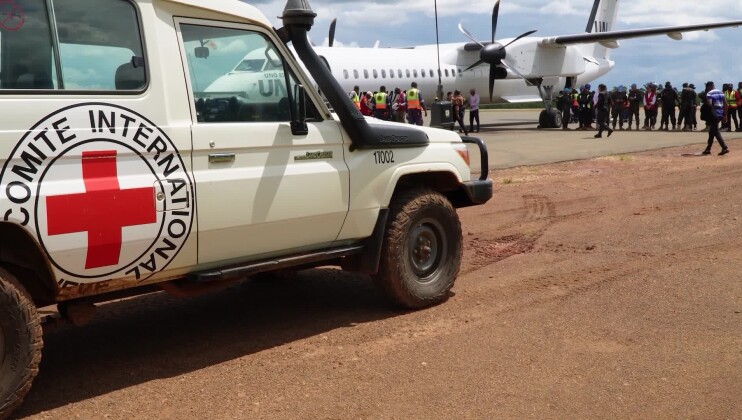Eating Snails to Survive: Violence and Hunger in DR Congo

This is a modal window.
|
Unrelenting violence in DR Congo is fuelling one of the largest and most serious humanitarian crises in the world in which millions are forced from their homes and struggling to feed themselves. Clashes have destroyed crops, while the grinding cycle of conflict and displacement has left many farmers unable to plant at all, forcing families to survive on whatever food they can forage.
In Mukambe, a remote village in the south-eastern province of Tanganyika, where inter-ethnic conflict has uprooted more than 650,000 people from their homes, families have resulted to eating mostly snails.
Roger, a resident of Mukambe, says that snails is almost the only food he, his wife, and their six children have eaten for months. It takes days searching deep in the bush to find enough to feed them all.
“Our food situation is dire,” Roger said. “Nothing is normal. Everything is very hard. We are being forced to eat snails. It’s not normal for us. You have to really search for them.”
Further west, in Kasai Province, families are also struggling to feed themselves after fighting forced them from their homes—often to live deep in the bush. Even as they return to their villages, food shortages persist as they were not able to plant and do not have the resources to purchase food.
A woman named Ngalula, who recently returned to her home in Kasai, said: “We fled from home to avoid being killed. We did not carry anything. We came back with nothing.”
For children, the situation is particularly critical. Nurse Thérèse Baswa is in charge of a nutrition program at a health centre in the village of Tshikaji that saw more than 300 malnourished children between May 2017 and January 2018.
“We receive a lot of cases of malnutrition because of the many changes when the people fled,” Baswa said. “They left everything behind.”
The International Committee of the Red Cross (ICRC), together with farming associations, is helping farmers to plan again by providing seeds, tools, and land given by local chiefs. Ngalula is one of them. “All these people are from Bupole Association. We work as a group to fight the famine in Kasai Central.”
The UN estimates that more than 4.6 million Congolese children are acutely malnourished—2.2 million of them severely acute, the most life-threatening form of malnutrition. Last year, escalating violence in DR Congo drove the highest recorded number of new displacements in the world. More than four million people in the country are estimated to be internally displaced—the highest on the continent. In the Democratic Republic of the Congo, the ICRC promotes respect for international humanitarian law in the treatment of civilians and detainees and helps those adversely affected by conflict and internal violence to survive and become self-sufficient. It also improves water supply and sanitation, strengthens health care for the wounded and sick, including victims of sexual violence, and reunites families separated by conflict and violence. |
|
|
|
|
Download this footage from ICRC Video Newsroom
For further information, please contact:
Crystal Wells, ICRC Nairobi, +254 716 897 265
Jean-Yves Clemenzo, ICRC Dakar (French), +221 78 639 86 29
Aurélie Lachant, ICRC Geneva, +41 79 244 64 05
Follow the ICRC on facebook.com/icrc and twitter.com/icrc
PHOTOS
Location: Province Tanganyika, Territoire Manono, Village Mikambwe DR Congo
Photos: Pedram Yazdi
Date: 02.03.2018
Copyright: ICRC access all
SHOTLIST
Location: Tanganikya and Kasai Central provinces, DR Congo
Camera: Mark Kamau
Length: 4:49
Format: HD H264 mov
ICRC ref: AV833
Date: 02.03.2018
Copyright: ICRC access all
Location: Mukambe, Tanganyika Province, DR Congo
0:00-00:21: Roger, a villager in Mukambe, Tanganikya Province, and his family search the forest for snails.
SOUNDBITE (in Kiswahili) Roger:
00:21-00:26: “Our food situation is dire. Nothing is normal. Everything is very hard.”
0:27-00:46: Roger searches for snails and carries them in a leaf to eat.
SOUNDBITE (in Kiswahili) Roger:
00:42-00:46: “We are being forced to eat snails. It’s not normal for us. You have to really search for them.”
00:47-00:54: Tight shots of snails
SOUNDBITE (in Kiswahili) Roger:
00:55-01:00: “It’s not normal for us. If you collect many of them, it’s enough for a day’s meal only.”
01:00-01:03 Roger’s wife preparing leaves leaves for dinner, a bowl of snails can be seen on the floor
Location: Kananga, Kasai Central Province, DR Congo
00:04 01:41: Women prepare food from leaves and roots in Ngalula’s homestead
SOUNDBITE (in Tshiluba) Ngalula, woman recently returned to home in Kasai Province after being displaced by violence:
01:42-01:46: “We fled from home to avoid being killed. We did not carry anything. We came back with nothing.”
SOUNDBITE (in French) Thérèse Baswa, nurse at health centre in Tshikaji, Kasai Province:
01:47-01:54: “We receive a lot of cases of malnutrition because of the many changes when the people fled. They left everything behind.”
01:55-02:04: Women from the Bupole Association, a farming association, walk down the road taking lunch to their colleagues planting in the association’s farm
SOUNDBITE (in Tshiluba) Ngalula:
02:05-02:09: “All these people are from Bupole Association.”
02:10-02:14: Members of Bupole Association planting
SOUNDBITE (in Tshiluba) Ngalula:
02:15-02:18: “We work as a group to fight the famine in Kasai Central.”
02:19-02:32: Members of Bupole Association cultivate
02:33-03:01: Members of Bupole Association bring food and eat meal
03:02-03:26: Members of Bupole Association planting
03:27-END: Children being screened and treated for malnutrition at Tshikaji health centre



